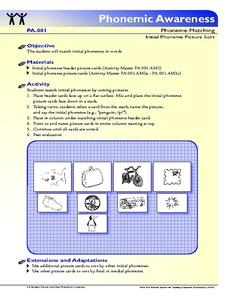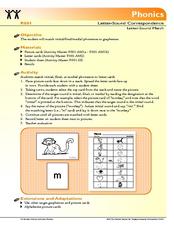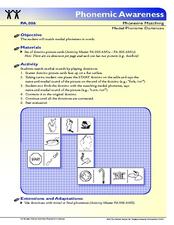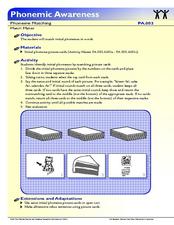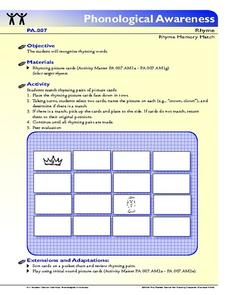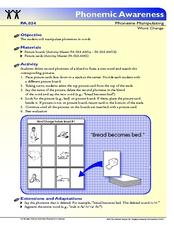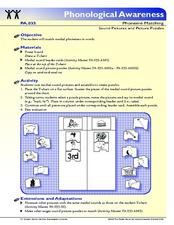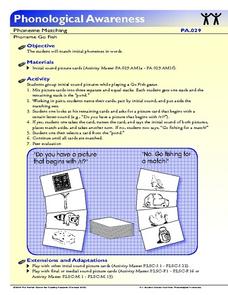Florida Center for Reading Research
Phonological Awareness: Phoneme Matching, Initial Phoneme Picture Sort
An activity focuses on phonemic awareness and initial letter sounds. Scholars sort picture cards by saying and matching the initial sounds each word makes.
Florida Center for Reading Research
Rhyming A-LOT-OH!
Rhymes are a great way to help your scholars with phonemic awareness and word relationships. Kids work with partners to match cards from a stack to their rhyming counterparts on a game board. There are six different boards, so this will...
Florida Center for Reading Research
Phonics: Letter-Sound Correspondence, Letter Sound Match
Scholars match initial, medial, and final phonemes to individual graphemes. They pick a card, say its name, then find the letter that makes that sound. If the card is a monkey, the learner finds the letter m, matching the grapheme to the...
Achieve3000
Discriminating Phonemes
Develop the fluency of beginning readers one sound at a time with this phonemic awareness lesson plan. Through a series of whole-class instruction, independent practice, and collaborative learning activities, children practice...
Florida Center for Reading Research
Phonological Awareness: Phoneme Matching, Medial Match
Early readers get together and match medial phonemes. They take turns picking picture cards from a pile; they say each word, then determine whether the pair has matching medial sounds.
Florida Center for Reading Research
Phonological Awareness: Phoneme Matching, Medial Phoneme Dominoes
Matching medial phonemes can be as easy as playing a game of dominoes! These dominoes contain pictures of items children can say. As they say each word aloud, they work to match the medial sound to one on an adjacent card. Just like real...
Florida Center for Reading Research
Phonological Awareness: Phoneme Matching, Match Maker
Pre-readers identify and match initial phonemes. Scholars take turns choosing one card from each of the three stacks. They say the name of the image on the card, then keep whichever cards have a matching initial phoneme.
Florida Center for Reading Research
Phonological Awareness: Phoneme Matching, Final Phoneme Memory
Try to match the final sounds in this memory game! Learners place all 24 cards upside down and take turns flipping them to see if the final phonemes match. If they do, remove them; if not, put them back. Partners play until all cards...
Florida Center for Reading Research
Phonological Awareness: Rhyme, Rhyme Memory Match
Young scholars play a memory-matching game to practice recognizing rhyming words and sounds. With picture cards, they flip over two cards and say the pictures' names. If the pair make a rhyming match, the learner keeps the cards. The...
Florida Center for Reading Research
Phonological Awareness: Phoneme Matching, Final Phoneme Pie
Words are interesting things—you can change them by adding or subtracting phonemes. Here, emergent readers change the pictures on their phoneme pie by removing or adding various final phonemes. A fun way to build phonetic competency!
Curated OER
Phonological Awareness, Phoneme Manipulating, Phoneme Position Sort
Scholars make new words out of old ones by manipulating phonemes. Pupils mix and match initial, medial, and final phonemes to change words like cap into cup or head into bed.
Florida Center for Reading Research
Phonological Awareness: Phoneme Manipulating, Word Change
Once your scholars know their letter sounds and recognize them in words, have them try making new words by manipulating phonemes. Pupils are given a word change picture board and a stack of word pictures. They pick a card and place it...
Florida Center for Reading Research
Fluency: Letter-Sound Correspondence, Make a Match
A memory activity engages young learners in letter-sound correspondence. Pairs take turns examining two sets of cards lying face down. They flip one image card and one letter card, then name the initial sound. If the sounds match, pupils...
Florida Center for Reading Research
Phonemic Awareness: Phoneme Matching, Sound Pictures and Picture Puzzles
Scholars use a T-chart and puzzle pieces to practice saying and recognizing the medial sound in a series of words. Peers take turns choosing a puzzle piece, saying its name and medial sound, then placing it on their side of the chart.
Florida Center for Reading Research
Word Blender
Little learners will love being able to blend sounds together to make words. This game provides eight onsets and eight rimes that can be used to mix and match to sound out words. This activity is to be completed in pairs and is a great...
Florida Center for Reading Research
Phonological Awareness: Phoneme Matching, Phoneme Go Fish
Go fishing for initial sounds with this engaging phoneme game! Similar to the card game Go Fish, pairs use picture cards and try to match initial sounds. They set aside any pictures that are a match and ask their partner for specific...
Florida Center for Reading Research
Phonological Awareness: Phoneme Matching, Sound Train
Make a phonics train filled with matching initial phonemes. Early readers say the name of the objects on each of their cards, identify the initial letter sounds or phonemes, then paste them on a train. They make three trains, which means...
Florida Center for Reading Research
Phonological Awareness: Phoneme Matching, Sound Bags
Peers pair up to find, identify and match medial phonemes. Peer one pulls a card or object from a bag, names it, then says its medial sound.—peer two attempts to find a picture or object whose medial sound matches the partner.
Florida Center for Reading Research
Phonological Awareness: Phoneme Matching, Sound Maker - Sound Smacker
Scholars sort words based on their initial phonemes. They choose cards, say their names, and match the initial phoneme to the one posted on one of the sorting bins. If the initial sound matches, they put the card in the sound maker bin,...
Florida Center for Reading Research
Phonological Awareness: Phoneme Matching, Pack-a-Backpack
Scholars sort words based on their initial phoneme or sound. Learners are given two backpacks, each with a picture card; they search and match picture cards with the same initial sound as the ones on each backpack.
Florida Center for Reading Research
Phonological Awareness: Phoneme Manipulating, What's Left?
Scholars subtract initial phonemes from given picture word cards to create new words. Feet becomes eat, and shelf becomes elf.
Florida Center for Reading Research
Phonological Awareness: Rhyme, Rhyming Game
Scholars practice their rhyming skills with a game. Players roll dice to move along the board game, stopping to rhyme words and find a match.
Florida Center for Reading Research
Phonics: Letter-Sound Correspondence, Medial Phoneme Spin
A collaborative activity challenges young scholars to match medial graphemes and phonemes. Pairs take turns spinning the spinner, naming the letter, and saying its name. They choose from a stack of cards with the same medial sound.
Florida Center for Reading Research
Phonological Awareness: Phoneme Isolating, The Last Sound Is...
Partners work with real objects as they practice final phonemes. Here's how it works: Partner A silently chooses an object and sounds it out, determining the final phoneme and saying the sound aloud. Partner B examines the group of...


